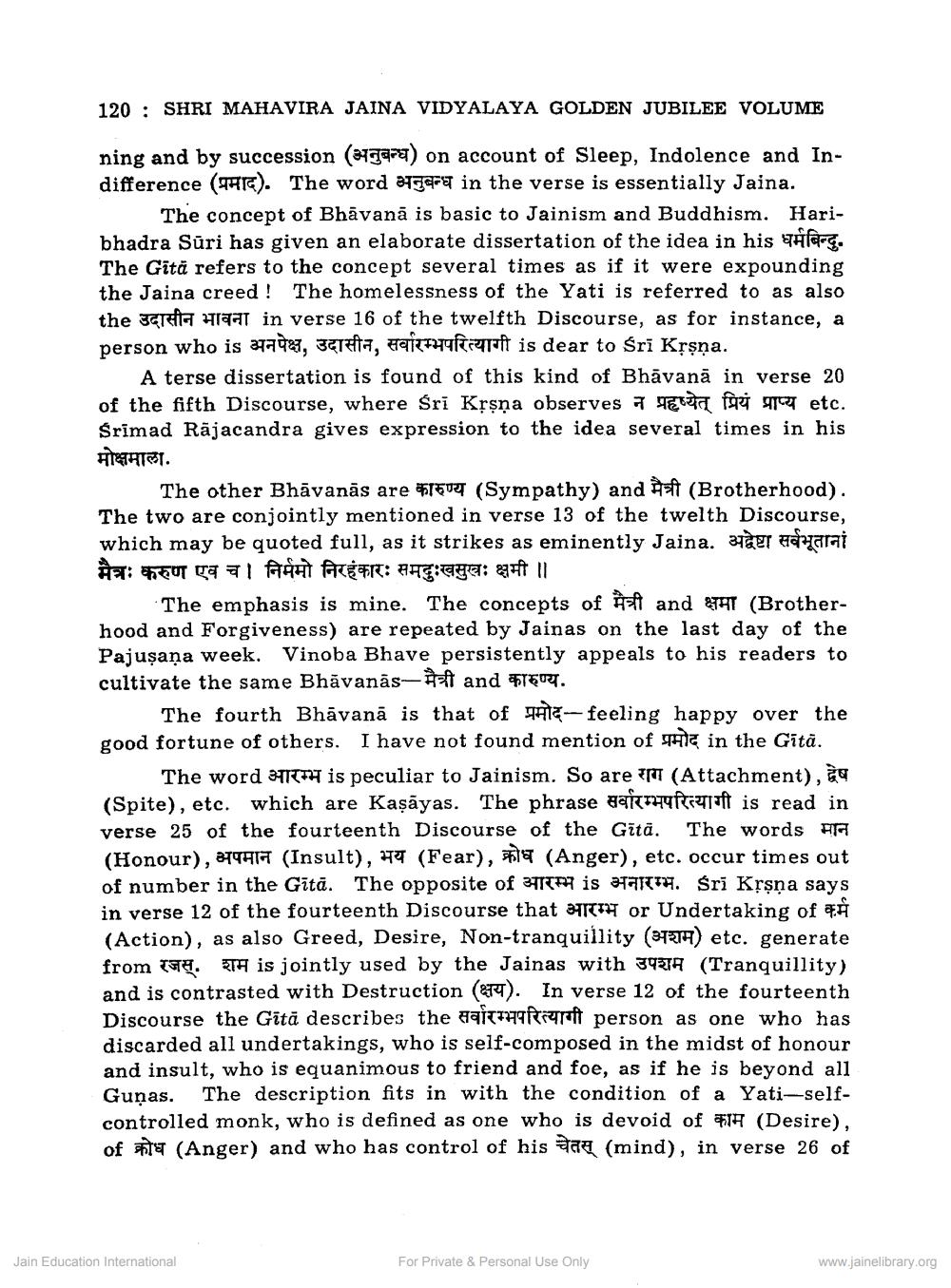Book Title: Jaina Phraseclogy in Bhagavadgita Author(s): K H Kamdar Publisher: Z_Mahavir_Jain_Vidyalay_Suvarna_Mahotsav_Granth_Part_1_012002.pdf and Mahavir_Jain_Vidyalay_Suvarna_ View full book textPage 3
________________ 120 SHRI MAHAVIRA JAINA VIDYALAYA GOLDEN JUBILEE VOLUME ning and by succession (4) on account of Sleep, Indolence and Indifference (H). The word age in the verse is essentially Jaina. The concept of Bhāvanā is basic to Jainism and Buddhism. Haribhadra Sūri has given an elaborate dissertation of the idea in his g The Gită refers to the concept several times as if it were expounding the Jaina creed! The homelessness of the Yati is referred to as also the art in verse 16 of the twelfth Discourse, as for instance, a person who is अनपेक्ष, उदासीन, सर्वारम्भपरित्यागी is dear to Sri Krsna. A terse dissertation is found of this kind of Bhāvanā in verse 20 of the fifth Discourse, where Śrī Kṛṣṇa observes etc. Srimad Rajacandra gives expression to the idea several times in his मोक्षमाला. The other Bhāvanās are (Sympathy) and (Brotherhood). The two are conjointly mentioned in verse 13 of the twelth Discourse, which may be quoted full, as it strikes as eminently Jaina. er darat मैत्रः करुण एव च । निर्ममो निरहंकारः समदुःखसुखः क्षमी ॥ The emphasis is mine. The concepts of and T (Brotherhood and Forgiveness) are repeated by Jainas on the last day of the Pajusaṇa week. Vinoba Bhave persistently appeals to his readers to cultivate the same Bhāvanās - मैत्री and कारुण्य. The fourth Bhāvanā is that of feeling happy over the good fortune of others. I have not found mention of in the Gitä. The word is peculiar to Jainism. So are (Attachment), द्वेष (Spite), etc. which are Kasayas. The phrase it is read in verse 25 of the fourteenth Discourse of the Gītā. The words मान (Honour) अपमान ( Insult ), भय (Fear) क्रोध (Anger), ete. occur times out of number in the Gitd. The opposite of mis a. Śrī Kṛṣṇa says in verse 12 of the fourteenth Discourse that or Undertaking of Я (Action), as also Greed, Desire, Non-tranquillity (1) etc. generate from रजस्. शम is jointly used by the Jainas with उपशम (Tranquillity) and is contrasted with Destruction (). In verse 12 of the fourteenth Discourse the Gità describes the after person as one who has discarded all undertakings, who is self-composed in the midst of honour and insult, who is equanimous to friend and foe, as if he is beyond all Gunas. The description fits in with the condition of a Yati-selfcontrolled monk, who is defined as one who is devoid of H (Desire), of (Anger) and who has control of his (mind), in verse 26 of Jain Education International " For Private & Personal Use Only www.jainelibrary.orgPage Navigation
1 2 3 4 5 6
